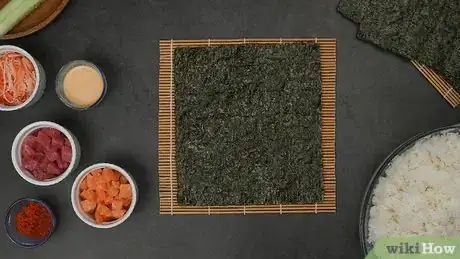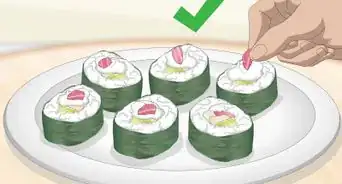This article was co-authored by Daniel Siriban. Daniel Siriban is a Japanese Personal Chef and the Owner of Roshi Experience. With over 18 years of culinary experience, he specializes in sushi, teppanyaki, and traditional Japanese dining. Daniel holds an AA in Restaurant, Culinary, and Catering Management from The Art Institute of California, Orange County.
There are 13 references cited in this article, which can be found at the bottom of the page.
wikiHow marks an article as reader-approved once it receives enough positive feedback. In this case, several readers have written to tell us that this article was helpful to them, earning it our reader-approved status.
This article has been viewed 569,928 times.
Sushi comes in all shapes and sizes, but there’s no denying that the roll is one of the most popular forms. You can make a roll with virtually any ingredient combination that you can think of. Besides the traditional maki roll with seaweed, or nori, on the outside, you can also make a roll with rice on the outside, or a cone-shaped roll called a hand roll. Follow this guide and seriously impress your next dinner party!
Steps
Making Maki Sushi
-
1Place a sheet of nori on your sushi mat.[1] Sheets of nori have a rough side and a smooth side. Place the nori so that the rough side is facing up.[2]
- You can find sushi mats and packages of nori at most Asian food markets. You can order both of them online as well (nori is dried and is easily shipped).
-
2Spread a ball of sushi rice on top.[3] It should evenly cover from the near edge to about an inch from the far edge of the sheet.[4]
- Start by placing the ball in the middle of the sheet of nori, and spread it out evenly.
- Use your fingers to spread the rice onto the nori. Keep your hands wet with a mixture of water and rice vinegar.
- Do not press or mash the rice, or it will not stick properly when rolling.
Advertisement -
3Start placing your filling ingredients. Place your ingredients in a line, starting on the near edge of the rice layer. Each ingredient should be in its own line, with each row placed a small space from the one before.[5] Some common maki ingredient combinations:
- Basic tuna or salmon roll: These rolls typically just have just tuna or salmon rolled up, without any other ingredients.
- Ahi roll: Yellowfin, cucumber, daikon, avocado.
- Shrimp tempura roll: shrimp tempura, avocado, cucumber.
- Phoenix roll: salmon, tuna, crab sticks, avocado, tempura batter (fried).
- If raw fish is to be used, it is important to use only expertly prepared fish to avoid food poisoning and tapeworm parasites.
-
4Hold the edge of the mat with your thumbs. Start with the edge that has your first ingredient next to it. Lift the nori and fold it over the first ingredient. Make sure to keep the ingredients in place and that the rice sticks together.
-
5
-
6Tighten the roll. You will need to tighten the roll to keep ingredients from falling out when you cut it. Remember to tighten the roll with your sushi mat often, but not too tightly. Roll the sushi roll back and forth in the mat to tighten and seal it.
-
7Allow the roll to sit for a minute before cutting it. You can use this time to make your next roll. This waiting period allows the nori to slightly moisten from the rice, which makes it less likely to tear.
-
8Cut the roll into sixths or eighths using a sharp, wet knife.[8] The thickness of the slices is determined by the number of ingredients. If you have more ingredients in the roll, the slices should be thinner.
-
9Serve your sushi immediately. Sushi is best when eaten freshly-made. Avoid refrigerating it for a later date. Experiment with different ingredients until you find your favorite combinations.
Making Uramaki Sushi
-
1Place a sheet of nori on the sushi mat. Nori should have a rough side and a smooth side. Place the nori so that the rough side is facing up.
-
2Spread a ball of sushi rice on top. It should evenly cover from the near edge to about an inch from the far edge of the sheet. Remove the nori and rice from the mat temporarily.
- Start by placing the ball in the middle of the sheet of nori, and spread it out evenly.
- Use your fingers to spread the rice onto the nori. Keep your hands wet with a mixture of water and rice vinegar.
-
3Prepare a sheet of plastic film about the size of your nori sheet. Lay it out on a flat surface and moisten it with a damp cloth.
-
4Lay the prepared plastic film over the rice spread on your nori.[9]
-
5Flip the nori, rice, and plastic stack.[10] Rest one hand on top of the plastic film and use your other hand to grab and flip the sushi mat from one edge. The stack should then rest on your palm. Lay the sushi mat back on your work surface and lay down the stack on top of it with the plastic side down.
-
6Start placing your filling ingredients. Place the ingredients in a line, directly onto the bare nori starting at the nearest edge of the sheet. Each ingredient should be in its own line, with each row placed a small space from the one before. Some common California roll ingredient combinations:
- Classic California roll: cucumber, crab stick, avocado.[11]
- Philadelphia roll: salmon or smoked salmon, cream cheese, cucumber.
- Butterfly roll: eel, crab stick, cucumber, topped with avocado.
- Sushi is a very visual food. Try experimenting with different colored ingredients to make a finished sushi that is as pleasing to look at as it is to eat.
-
7Start rolling. Hold the edge of the mat with your thumbs. Start with the edge that has your first ingredient next to it. Lift the plastic film and fold it over the first ingredient. Make sure to keep the ingredients in place. Fold until the rice has folded over and stuck to the nori.
-
8Start removing the plastic. Once the rice has stuck, gently pull the plastic out of the roll. Keep pulling the plastic out as you continue to fold the roll over.
- Keep tightening the roll as you fold it. This will keep the inside ingredients in place.
-
9Top your roll. Depending on your recipe, you may want to top your roll. You can use avocado, sesame seeds, fish, tobiko (fish eggs) or anything else you can think of.
-
10Cut the roll into sixths or eighths using a sharp, wet knife.[12] The thickness of the slices is determined by the number of ingredients. If you have more ingredients in the roll, the slices should be thinner.
-
11Serve immediately.
Making a Hand Roll
-
1Cradle a sheet of nori in your hand.[13] You should hold it in your non-dominant hand. Make sure to hold it with the shiny side down.
- One end of the sheet should be in your palm, with the opposite end extending up past your fingers.
-
2Place a ball of sushi rice in the nori directly over your palm. Dip your hand in water mixed with rice vinegar to keep the rice from sticking. Spread the rice so that it covers the bottom third of the nori sheet.[14]
- You should aim to use about 1/2 cup of rice per roll.
-
3Make an indentation in the center of the rice. Place your ingredients into the indentation, and don’t overstuff it or you’ll have a difficult time rolling it up later. Some of the more popular combinations for hand rolls:
- Spicy tuna roll: Chopped tuna, mayonnaise, chili sauce, cucumber, carrot
- Rock ‘n Roll: eel, cream cheese, avocado
- Tamago roll: pan-fried rolled omelet, lettuce, avocado.
-
4Start rolling. Lift the bottom corner of the nori, and fold it over the ingredients, creating a cone shape. Continue rolling, making sure that the roll is tight as possible.[15]
- Press several single grains of rice into the bare end of the nori. These will act as "glue" as the sushi forms a roll.
- You do not need to cut hand rolls. Dip the corner that you are planning to eat in the soy sauce, instead of pouring soy sauce on the whole thing. This will keep it from falling apart.
-
5Finished.
Community Q&A
-
QuestionHow many pieces are in a roll of sushi?
 Community AnswerMost sushi rolls contain 6 to 8 pieces. The more pieces is contains, the thinner the final rolls will be.
Community AnswerMost sushi rolls contain 6 to 8 pieces. The more pieces is contains, the thinner the final rolls will be. -
QuestionDo you wet nori before rolling sushi?
 Community AnswerNo, but you should wet your hands with a solution of water and rice vinegar as you spread the rice over it.
Community AnswerNo, but you should wet your hands with a solution of water and rice vinegar as you spread the rice over it. -
QuestionWhere in the Chicago Area can I buy a sushi mat to make Sushi Rolls?
 Community AnswerTry poking around the shops in Chinatown. There's definitely a few shops that carry bamboo mats.
Community AnswerTry poking around the shops in Chinatown. There's definitely a few shops that carry bamboo mats.
Warnings
- When cooking your rice, make sure to use shorter grains of rice, and don't use oil, as the rice is supposed to be sticky.⧼thumbs_response⧽
- Use the highest quality, freshest ingredients you can find. Don't be cheap if you're eating raw fish.⧼thumbs_response⧽
- Use caution when handling raw fish; wash your hands often.[16]⧼thumbs_response⧽
- Crab meat and other shellfish are very dangerous to eat raw. Raw fish used in sushi must be properly prepared to avoid dangers of parasites and bacteria.[17] You can buy properly prepared sushi grade fish at Japanese markets where it should be clearly marked "for sushi". Be safe, do your research.⧼thumbs_response⧽
- Fresh raw fish for sushi should be read as "fresh fish that was properly prepared and quickly frozen." Deep freezing is one of a number of steps taken for food safety's sake. Deep freezing kills tapeworm spores.[18]⧼thumbs_response⧽
- Be sure to use a sharp knife when you cut your sushi, or it may tear.⧼thumbs_response⧽
Things You'll Need
- A (bamboo) sushi mat or breadboard
- Plastic food wrap
- Seaweed, or nori, in sheet form
- 1 cup of sushi rice
- Filling (vegetables, fish, crab). See Warnings
References
- ↑ Daniel Siriban. Japanese Personal Chef. Expert Interview. 1 September 2021.
- ↑ https://www.sushifaq.com/sushiotaku/basic_recipe/maki-sushi-cut-rolls/
- ↑ Daniel Siriban. Japanese Personal Chef. Expert Interview. 1 September 2021.
- ↑ https://www.sushifaq.com/sushiotaku/basic_recipe/maki-sushi-cut-rolls/
- ↑ http://makemysushi.com/index.php/How-to-make-sushi/maki-roll.html
- ↑ https://www.curiouscuisiniere.com/maki-rolls/
- ↑ Daniel Siriban. Japanese Personal Chef. Expert Interview. 1 September 2021.
- ↑ https://www.sushifaq.com/sushiotaku/basic_recipe/maki-sushi-cut-rolls/
- ↑ https://www.rotinrice.com/uramaki-inside-out-roll/
- ↑ https://www.rotinrice.com/uramaki-inside-out-roll/
- ↑ https://www.foodnetwork.com/recipes/alton-brown/california-roll-recipe-1916375
- ↑ http://secretsofsushi.com/how-to-roll-sushi
- ↑ https://www.justonecookbook.com/temaki-sushi-hand-roll/
- ↑ http://www.japanesecooking101.com/hand-roll-sushi-recipe/
- ↑ https://www.justonecookbook.com/temaki-sushi-hand-roll/
- ↑ https://www.cdc.gov/features/handwashing/index.html
- ↑ https://www.health.ny.gov/diseases/communicable/vibriosis/dangers_of_eating_raw_shellfish.htm
- ↑ https://www.nytimes.com/2015/05/19/science/freezing-fish-killing-parasites.html
- https://www.justonecookbook.com/sushi-rolls/
About This Article
To easily roll sushi without a mat, start by holding a sheet of edible seaweed flat in the palm of your hand. Then, place a small ball of rice in the center of the seaweed and make an indent in the top of the ball with your finger. Place your sushi ingredients in the indent so that it's full but not overflowing. Finally, roll the sheet of seaweed over the ingredients inside and use a couple grains of sticky rice to glue the edge of the roll together. To learn how to roll sushi with a sushi mat, keep reading!
























































